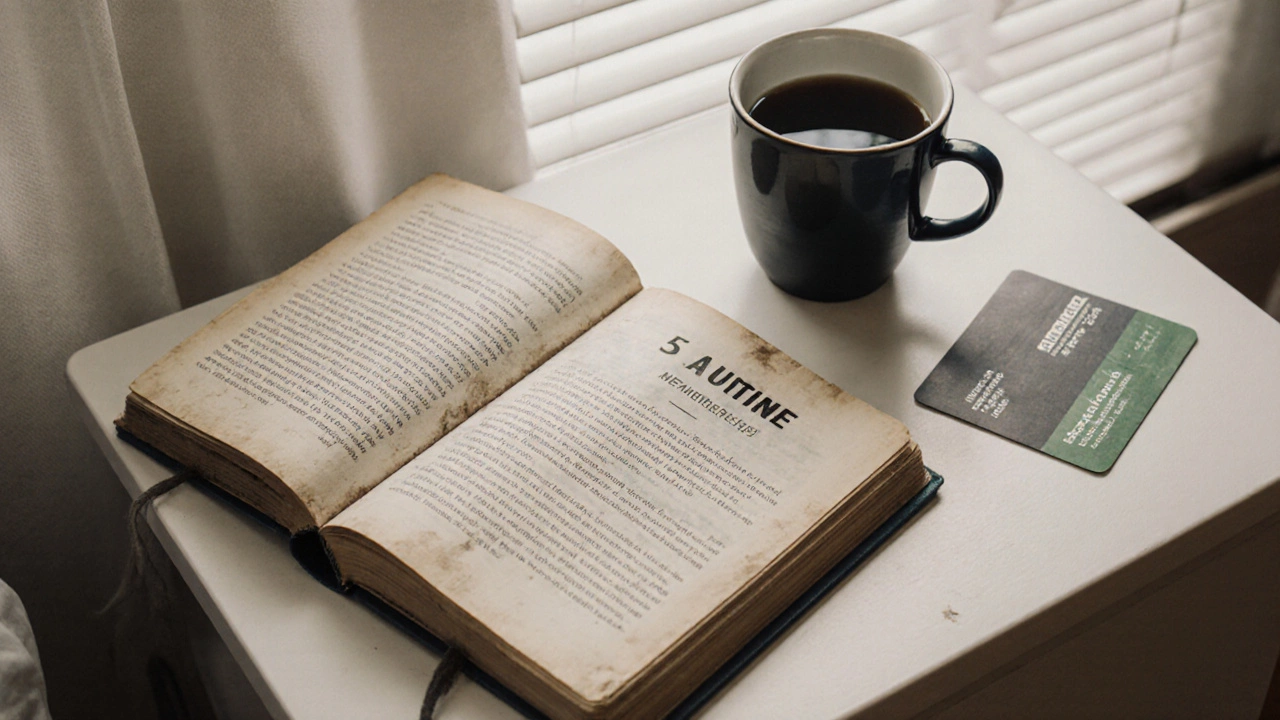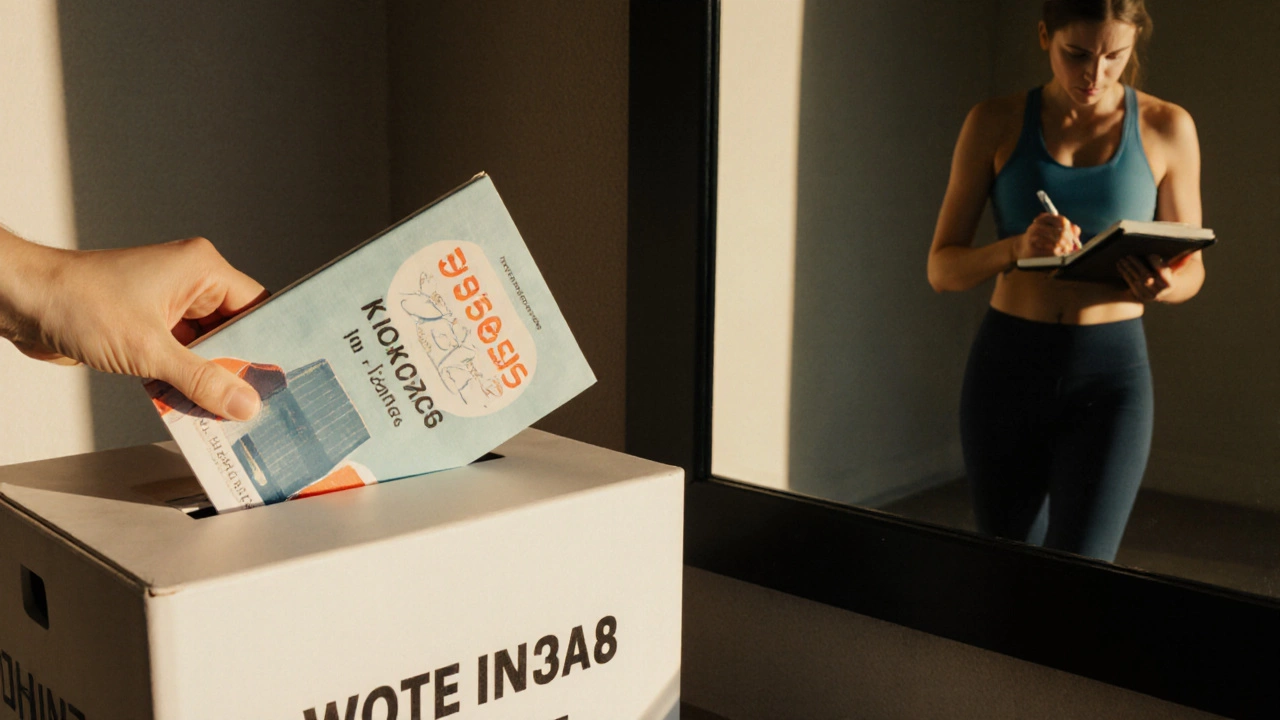Do self-help books really help? The truth behind the hype
 Nov, 17 2025
Nov, 17 2025
Self-Help Action Tracker
Your 30-Day Action Plan
Based on the article: "Do self-help books really help? The truth behind the hype"
Choose ONE small action from a self-help book and commit to it for 30 days.
Remember: Real change comes from doing—not reading.
Ever bought a self-help book hoping it would fix your life-only to find it gathering dust on the shelf next to your old gym membership card? You’re not alone. Millions of people buy these books every year. The global self-help market is worth over $15 billion. But here’s the uncomfortable question: do they actually work?
What self-help books promise vs. what they deliver
Self-help books sell transformation. Self-help books promise you’ll be more confident, productive, wealthy, or emotionally balanced-often in 30 days or less. Titles like The 5 AM Club, Atomic Habits, or How to Win Friends and Influence People sound like magic manuals. But magic doesn’t exist. Real change takes time, repetition, and effort.
Many of these books recycle ideas from psychology, philosophy, and behavioral science. They take complex research-like the 21-day habit formation myth-and turn it into catchy slogans. The problem isn’t the advice itself. It’s the packaging. They make you believe reading a chapter is the same as doing the work. It’s not.
A 2019 study from the University of California, Berkeley tracked 1,200 people who bought best-selling self-help books. After six months, only 18% reported any measurable improvement in their goals. The rest? They felt worse. Why? Because they compared their messy reality to the polished lives in the book’s case studies. That’s not motivation. That’s guilt.
The placebo effect of self-help
Let’s be honest: sometimes, buying the book feels like progress. You feel better just because you bought it. That’s the placebo effect in action. You think, “I’m doing something about my life now,” and that feeling of control is powerful. But control isn’t change.
Think of it like buying a new running shoe. You feel ready to run a marathon. But if you never lace them up, you’re still on the couch. The book is the shoe. The action is the run. Most people never get past the shoe.
Some self-help books do work-for the right person, at the right time. A person struggling with anxiety might find comfort in The Gifts of Imperfection by Brené Brown. Someone overwhelmed by clutter might finally clean their home after reading The Life-Changing Magic of Tidying Up. But those are exceptions. They work because the reader was already primed to change. The book didn’t fix them. It gave them permission to try.
Why most self-help fails
There are five big reasons self-help books rarely lead to lasting change:
- They’re generic. Advice like “believe in yourself” or “visualize success” sounds nice but doesn’t tell you how to start. What if you don’t know what you believe in? What if visualizing makes you feel more stuck?
- They ignore context. A single mom working two jobs doesn’t have 45 minutes to meditate. A student with debt can’t afford to quit their job to “follow their passion.” Self-help often assumes you have time, money, and safety nets you don’t have.
- They lack accountability. No one checks in. No one asks if you did the exercises. No one holds you to it. That’s why coaching, therapy, or even a friend who asks, “Did you try the journaling?” works better.
- They’re written by people who succeeded. The author of Think and Grow Rich was rich. The author of The Subtle Art of Not Giving a F*ck has a massive platform. Their advice assumes you’re starting from the same place. You’re not.
- They create dependency. You buy one book, then another, then a course, then a podcast, then a retreat. You’re spending money chasing the next fix instead of building real skills.
When self-help books actually help
There’s a real use for these books-but it’s not what you think.
Self-help books work best as spark plugs, not engines. They can ignite a thought. They can make you say, “Wait, maybe I don’t have to live like this.” That’s valuable. But that’s just step one.
Here’s how to use them right:
- Choose one book. Not five. One.
- Read it once. Then close it.
- Pick ONE small action from it. Not ten. One.
- Do that action for 30 days. No exceptions.
- After 30 days, ask: Did it make a difference? If yes, keep going. If no, drop it.
That’s it. No need for a second book. No need to join a Facebook group. No need to track your progress in a spreadsheet. Just one habit, built slowly.
Take Atomic Habits. James Clear’s core idea is simple: focus on systems, not goals. Instead of saying, “I want to lose 20 pounds,” say, “I’m going to walk for 10 minutes after dinner every day.” That’s powerful. But only if you actually walk.

The real alternative to self-help books
If you want real change, skip the books. Try this instead:
- Therapy or coaching. A trained person helps you untangle your thoughts, not just repeat slogans.
- Accountability partners. Find someone who’s also trying to change. Text each other weekly. No judgment. Just check-ins.
- Small, daily actions. One push-up. One page of journaling. One deep breath before you answer your phone. Tiny steps build real momentum.
- Reading fiction. Yes, fiction. Studies show reading novels improves empathy and emotional intelligence more than self-help. Why? Because stories show you how people actually live-not how they should live.
Self-help books aren’t evil. They’re just overhyped. They’re not the solution. They’re a starting point-if you use them right.
What to do next
If you’re holding a self-help book right now, don’t throw it away. But don’t let it sit on your nightstand either.
Open it. Find one sentence that feels true. Then write down one tiny thing you can do today based on it. Do it. Then forget the book.
Real change doesn’t come from reading about change. It comes from doing it-even when it’s boring, even when no one is watching, even when you don’t feel like it.
The best self-help book you’ll ever read is the one you stop reading and start living.
Do self-help books actually improve mental health?
Some can, but only if they’re used as a supplement-not a replacement-for professional care. Books like The Happiness Trap by Russ Harris, based on Acceptance and Commitment Therapy (ACT), have clinical backing. But they’re not therapy. If you’re dealing with depression, anxiety, or trauma, a licensed therapist is far more effective. Self-help books can offer tools, but they can’t diagnose or treat.
Why do self-help books cost so much if they’re just ideas?
They’re not selling ideas-they’re selling hope. The price isn’t for the paper or the PDF. It’s for the feeling that you’re taking control. Publishers know people will pay $25 for the chance to fix their life. And most of the time, that’s all they get: a feeling. The real value comes from action, not the book’s cover.
Are there any self-help books worth reading?
Yes-but only if you read them the right way. Atomic Habits by James Clear, The Subtle Art of Not Giving a F*ck by Mark Manson, and Man’s Search for Meaning by Viktor Frankl stand out. They’re grounded, honest, and avoid empty positivity. But again: reading them won’t change you. Doing one thing from them will.
Is it better to listen to podcasts or read self-help books?
Neither is better. Both are passive. The difference is in what you do after. A podcast might inspire you during your commute. A book might give you a moment of quiet reflection. But if you don’t act on what you hear or read, it’s just noise. Action is the only metric that matters.
Can self-help books make you feel worse?
Absolutely. Many books imply that if you’re not happy, successful, or disciplined, it’s your fault. That’s shame-based marketing. If you’re struggling and the book says, “Just believe in yourself,” it can make you feel broken. Real growth comes from compassion, not pressure. Choose books that meet you where you are-not where they wish you were.